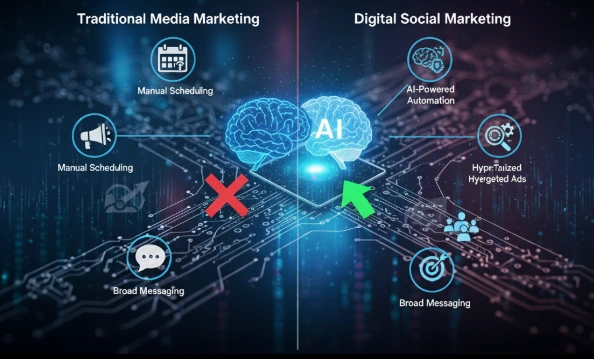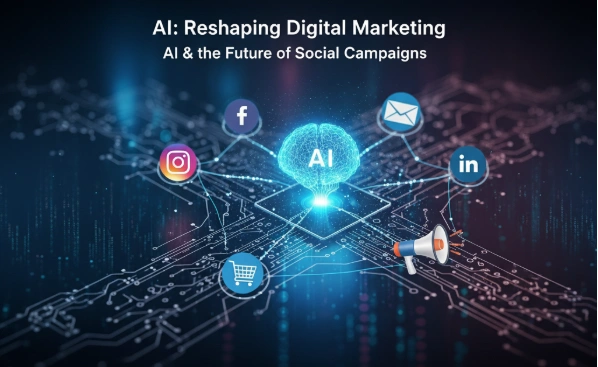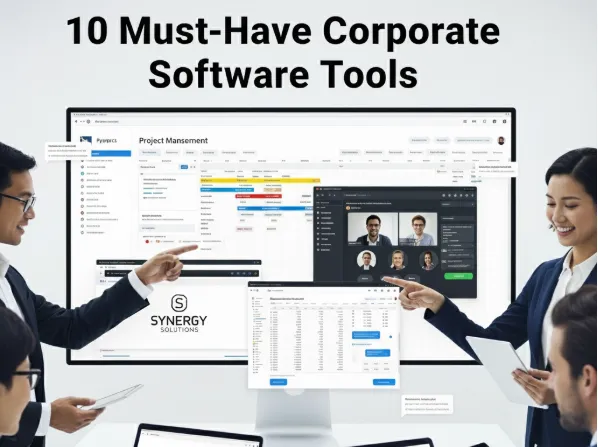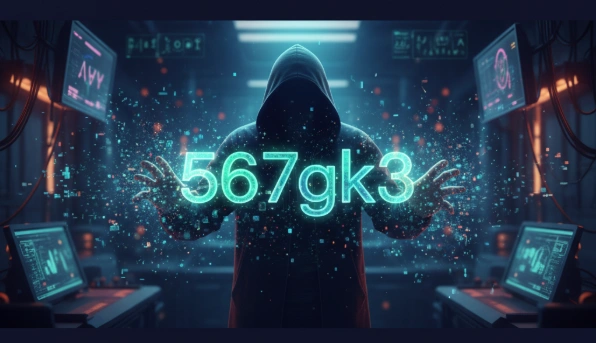Digital Social Marketing vs. Traditional Social Media Marketing: What’s the Real Difference?
In today’s digital world, marketing is constantly evolving, and it’s easy to get lost in the jargon. Two terms you’ll often hear—Digital Social Marketing (DSM) and Traditional Social Media Marketing (SMM)—might seem interchangeable, but they’re actually quite different. Understanding the distinction isn’t just academic; it can make or break your online strategy.
Let’s unpack what sets them apart and why both matter.
The Big Picture: Platform Focus vs. Audience Focus
Think of Traditional Social Media Marketing as one piece of a larger puzzle. Its goal? To engage people on specific platforms like Instagram, Facebook, X (Twitter), LinkedIn, or TikTok. It’s very platform-centric: “How can we make content that clicks on this app?”
Digital Social Marketing, on the other hand, zooms out. It’s about understanding where your audience lives online—not just on major social apps—and being part of those conversations. Forums, review sites, blog comments, and even YouTube discussions all count. DSM asks: “Where are our people talking, and how can we genuinely participate?”
Quick Comparison
| Feature | Traditional Social Media Marketing | Digital Social Marketing |
|---|---|---|
| Focus | Engagement on a specific platform | Building community and trust across the web |
| Scope | Major social networks | Entire digital ecosystem (forums, blogs, review sites, etc.) |
| Metrics | Likes, shares, follower counts | Sentiment, share of voice, brand advocacy |
| Content | Platform-native posts, stories, reels | Advice, forum replies, reviews, comments, etc. |
| Team | Social Media Manager | Community Manager, Digital PR, Customer Service |
| Goal | Awareness and engagement | Trust, authority, reputation |
Platforms vs. The Entire Digital Ecosystem
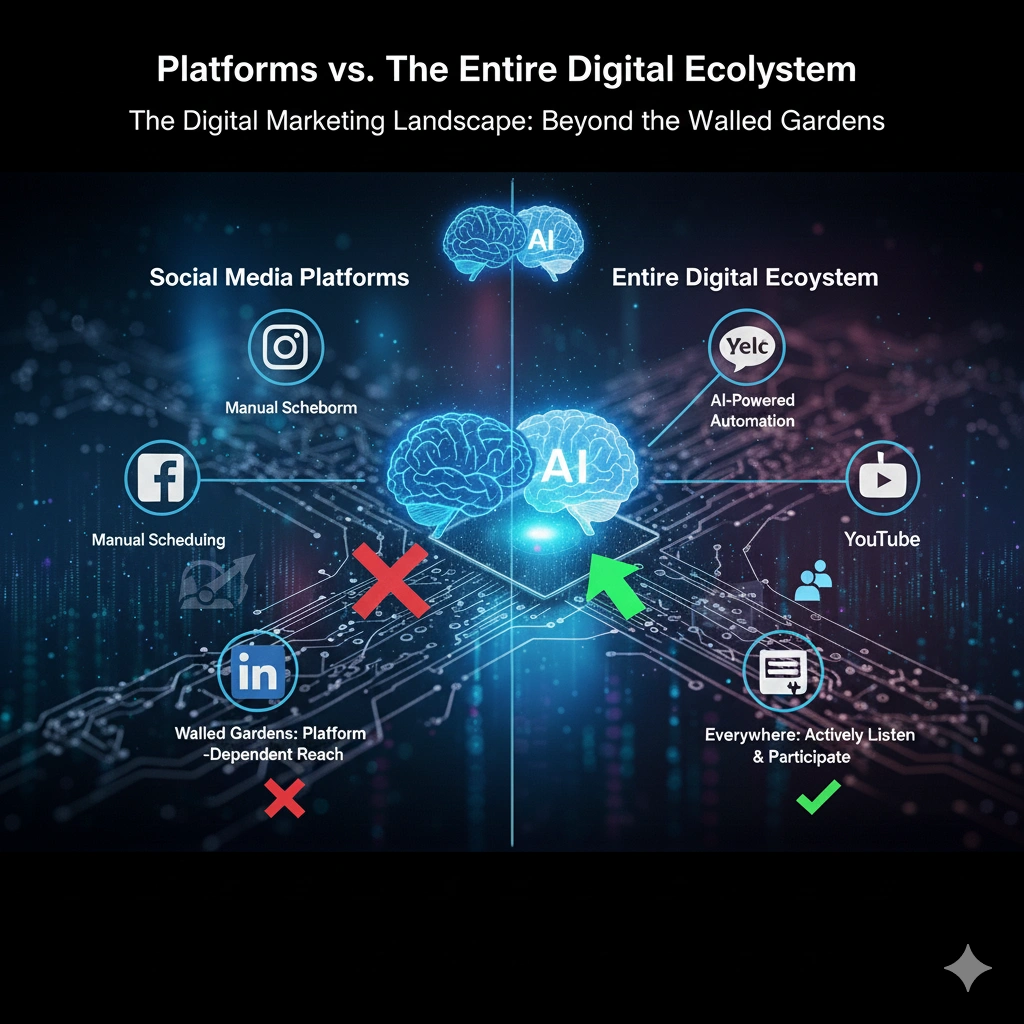
SMM operates in “walled gardens.” Your content is shaped by the platform’s rules and algorithms. Post a story on Instagram and hope the algorithm delivers it to your followers.
DSM takes a wider view. Conversations about your brand can happen anywhere:
- Review sites like Yelp, TripAdvisor, or Google Business Profile
- Online forums such as Reddit, Quora, or niche industry communities
- Blog comments on your own site or relevant industry blogs
- Video platforms like YouTube
A DSM strategy actively listens, participates, and adds value wherever your audience interacts.
Broadcasting vs. Conversing
SMM often feels like broadcasting: you create content, post it, and wait for reactions. It’s one-to-many communication.
DSM is about conversation. It’s responding to questions on Quora, giving advice in a forum, or replying thoughtfully to a negative review. It’s personal, human, and trust-building. One-to-one, or sometimes few-to-few, but much more impactful.
Measuring Success: Vanity vs. Value
Traditional metrics like follower count, likes, or shares look nice on a report, but do they really show success? Not always.
DSM focuses on value-driven metrics, including:
- Sentiment – Are people saying positive things about your brand?
- Share of voice – How much of the industry conversation mentions you vs. competitors?
- Brand advocacy – Are your customers promoting you voluntarily?
- Issue resolution – Turning complaints into loyal fans
Why It Matters
Today’s consumers can tell the difference between a brand that’s genuinely involved and one that’s just broadcasting ads. DSM builds trust, authority, and credibility—while SMM can get people to notice you. Together, they’re a powerhouse.
A brand practicing DSM effectively is seen as:
- More authentic and human
- More trustworthy
- An authority in its niche
- Customer-focused
The Perfect Blend
You don’t have to choose. The most effective strategy combines both:
- Use Traditional Social Media Marketing to share content, boost awareness, and run ads.
- Use Digital Social Marketing to listen, engage meaningfully, manage your reputation, and guide your SMM efforts with real insights.
Conclusion
SMM is about showing up on the platforms that matter; DSM is about showing up with a personality, everywhere your audience is talking. Master both, and your brand won’t just exist online—it will thrive.
FAQs
Q1: What is the difference between Digital Social Marketing and Traditional Social Media Marketing?
A: Traditional Social Media Marketing focuses on platform-specific engagement like likes, shares, and posts, while Digital Social Marketing builds trust, authority, and conversation across the entire digital ecosystem.
Q2: Why is Digital Social Marketing important for brands today?
A: Consumers value authentic engagement. DSM helps brands build credibility, manage reputation, and connect with audiences where conversations are happening, not just on social apps.
Q3: Can a business use both DSM and SMM together?
A: Yes! Combining Traditional SMM for awareness and DSM for community building and trust maximizes your overall digital strategy.
Q4: What metrics should I track for Digital Social Marketing?
A: Focus on sentiment analysis, share of voice, brand advocacy, and issue resolution rather than just likes and followers.
Q5: How can Digital Social Marketing improve customer trust?
A: By actively engaging in forums, responding to reviews, answering questions, and providing helpful insights, brands appear more authentic and human.

